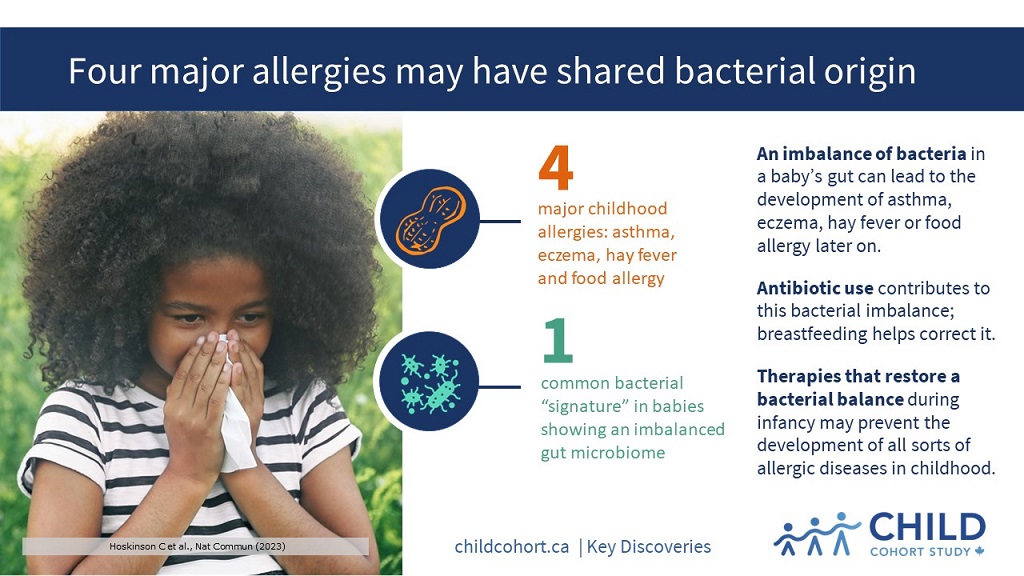
Several major childhood allergies may share a common link to the community of bacteria living in our gut, according to a new study led by CHILD researchers at BC Children’s Hospital and the University of British Columbia (UBC).
The research, published in Nature Communications, identifies gut microbiome features and early-life influences associated with children developing allergies by age five. The findings could lead to methods of predicting if a child will develop allergies, and even to preventing them from developing.
“Hundreds of millions of children worldwide suffer from allergies, including one in three children in Canada, and it’s important to understand why this is happening and how it can be prevented,” says CHILD Co-Director Dr. Stuart Turvey, an investigator at BC Children’s Hospital Research Institute and professor in the department of pediatrics at UBC, and co-senior author on the study.
The study is one of the first to examine four distinct school-aged pediatric allergies at once: atopic dermatitis (eczema), asthma, food allergy and allergic rhinitis (hay fever). While these allergic diseases often have unique symptoms, the Turvey lab was curious if they might have a common origin linked to the infant gut microbiome.
Coverage of this research by Global News
“These are technically different diagnoses, each with their own list of symptoms, so most researchers tend to study them individually,” says Dr. Charisse Petersen, co-senior author on the paper and a postdoctoral fellow in the Turvey lab. “But when you look at what is going wrong at a cellular level, they actually have a lot in common.”
For this study, the researchers examined the data gathered from clinical assessments with 1,115 CHILD participants tracked from birth to age five. Roughly half of the children (523) had no evidence of allergies at any time, while more than half (592) were diagnosed with one or more allergic disorders by an expert physician at the five-year scheduled visit. The researchers evaluated the participants’ microbiomes from stool samples collected at three months and one year.
The stool samples revealed a bacterial signature that was associated with children developing any of the four allergies by five years of age. The signature is a hallmark of dysbiosis, or an imbalanced gut microbiota, that likely resulted in reduced barrier integrity and an elevated inflammatory response within the gut.
“Typically, our bodies tolerate the millions of bacteria living in our guts because they do so many good things for our health. Some of the ways we tolerate them are by keeping a strong barrier between them and our immune cells and by limiting inflammatory signals that would call those immune cells into action,” says Courtney Hoskinson, a PhD candidate at UBC and first author on the paper. “We found a common breakdown in these mechanisms in babies prior to the development of allergies.”
Many factors can shape the infant gut microbiota, including: diet, how we are born, where we live, and our exposure to antibiotics. For example, antibiotics may wipe out sensitive bacteria, while breastfeeding tends to replenish and provide necessary food for bacteria in the infant gut. The researchers examined how these types of influences affected the balance of gut microbiota and the development of allergies.
“There are a lot of potential insights from this robust analysis,” says Dr. Turvey. “From these data we can see that factors such as antibiotic usage in the first year of life are more likely to result in later allergic disorders, while breastfeeding for the first six months is protective. This was universal to all the allergic disorders we studied.”

The researchers hope to leverage the findings to inform treatments that correct an imbalanced gut microbiota and could potentially prevent allergies from developing.
“Developing therapies that change these interactions during infancy may therefore prevent the development of all sorts of allergic diseases in childhood, which often last a lifetime,” says Dr. Turvey.
“CHILD is unique in allowing us to go back to see what biological changes in their infancy might have led to these diseases later on,” says Dr. Turvey. “This study provides insight into underappreciated and nuanced aspects of the infant microbiome that will enable improved prevention and prediction of allergic disease.”
UBC story | BCCHR story | Global News | Toronto Star | Allergic Living | Scientific American
See the Key Finding profile for this discovery.

